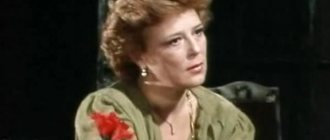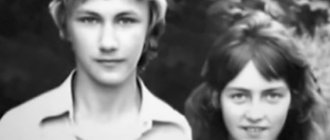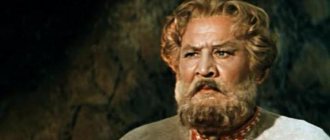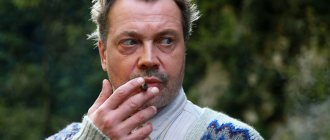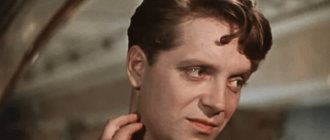- June 21, 2019
- Art
- Olga Strelkova
Speaking about the biography of the artist Vladimir Andreev, it should be noted that this is one of the most talented representatives of this profession. His roles in theater and cinema were always memorable from the very first minutes. In addition to creating various images on stage and in cinema, he also teaches acting to students. And also the biography of actor Vladimir Andreev is marked by such facts as awarding him the title of People's Artist of the RSFSR, and then the USSR, awarding the prize to them. Stanislavsky and some others. He is also known as a screenwriter and theater director. Next, the biography, family and wives of actor Vladimir Andreev will be described in detail.
Childhood and adolescence
The biography of actor Vladimir Andreev began in the Russian capital, on Bolshaya Spasskaya Street. The year of his birth is 1930. It should be noted that the boy’s parents were in no way involved in either the theatrical or cinematic environment. Moreover, they were not engaged in any other creative professions. But nevertheless, both were avid theatergoers and did not miss a single premiere in the capital.
It is not surprising that this hobby was passed on to their son Volodya. The guy not only took great pleasure in going to theater performances with his parents, but also showed his abilities in the theater club. Somewhat later, here he made acquaintance with Rolan Bykov, and he gave him advice to test his strength by trying to enter GITIS.
Growing up
The times were difficult. While still a teenager, after studying he had to work at a factory, where he took a seat at a machine, producing parts for military equipment.
In addition, he actively showed himself in the theater group, being one of the best students. There, in the circle, he made his fatal acquaintance with Rolan Bykov , who advised the boy not to be afraid to enter GITIS in the future.
While preparing to enter the legendary university, Andreev worked with actress Varvara Ryzhova. He met the expectations of his mentor and parents and became a student at GITIS.
It was 1948, when Vladimir was enrolled in A. Lobanov’s course. He also had the honor of learning the skills of an artist from V. Vronskaya and An. Goncharova.
Passed the tests with honor
Vladimir Andreev had no doubts about this, and he began preparing to enter a theater university. The future celebrity received significant assistance in this from Varvara Ryzhova, a talented actress. He passed the entrance examination with flying colors, and was admitted to the institute in 1948. The artistic director of his course was Andrei Lobanov.
Other mentors of the future star included Andrei Goncharov and Varvara Vronskaya, who were popular actors at that time. But, as Vladimir Alekseevich admitted later, the person who greatly influenced his future artistic destiny was Andrei Lobanov.
Childhood and youth
Vladimir Andreev spent his childhood in Moscow, on Bolshaya Spasskaya Street. The future actor was born on August 27, 1930. Vladimir Alekseevich’s parents had nothing to do with the theatrical environment or other creative professions, but they constantly followed theatrical events, not missing a single premiere.
Actor Vladimir Andreev
This hobby did not escape Vladimir Andreev: the boy not only attended the theater with his parents, but also happily studied in a children's theater group. A little later, in the same circle, Vladimir Alekseevich met Rolan Bykov, who advised the young talent to try his hand at entering the legendary GITIS.
Vladimir Andreev, without hesitation, began to prepare to enter the theater school. The future star was helped by the talented actress Varvara Ryzhova. Andreev passed the entrance examinations with dignity, and in 1948 the future star was admitted to the institute. Andrey Lobanov became the artistic director of the course where Vladimir Andreev studied.
Vladimir Andreev in his youth
In addition to Lobanov, popular actors of that time Varvara Vronskaya and Andrei Goncharov became Vladimir Andreev’s mentors. But, by Vladimir Alekseevich’s own admission, only Andrei Lobanov turned out to be the person who influenced the future fate of the aspiring actor.
On the theater stage
Continuing our consideration of the biography of actor Vladimir Andreev, it is necessary to mention his theatrical activities. The artist graduated from the institute in 1952. And he was invited to the Ermolova Theater, where his teacher Andrei Lobanov was the director. He invited Vladimir to become a member of the troupe. There Andreev played his first roles and worked on his native stage for 18 years. He always appeared on the stage of this temple of art with great excitement and joy.
In 1970, he already acted as the main director of this team. Under his leadership, many performances were staged at the Ermolovsky Theater. The most notable of them were, for example, such productions as “Coincidence of Circumstances” and “Elder Son”. They were staged based on the plays of the famous playwright Vampilov. Andreev also created performances based on the works of young talents at that time, among whom we can name, first of all, Diaz Valeev and Eduard Volodarsky.
Personal life
Vladimir Andreev’s personal life developed just as smoothly and happily as his professional one. Natalya Selezneva became Vladimir Alekseevich’s happy chosen one. The lovers met on the set of the film “Caliph the Stork”. The wedding of Andreev and Selezneva took place in 1968.
Vladimir Andreev and Natalya Selezneva
And a year later, in 1969, Vladimir Andreev became a father. The wife gave the man a son, who was named Yegor.
Behind-the-scenes feuds
It is no secret that behind the scenes of the temples of Melpomene serious passions sometimes rage. They didn’t pass by Ermolova’s theater either. In the eighties of the last century, there were divisions within the team here. Internal conflicts almost brought the troupe to complete collapse. Andreev was unable to endure such cataclysms and decided to leave the theater, despite all his love for it.
Vladimir Alekseevich was invited to work at the Maly Theater, where he found himself in the place of the chief director. And Valery Fokin came to his place at the Ermolov Theater. However, in 1990, Andreev was again drawn to his native walls, and to this day he does not leave them. At first he was the artistic director of the theater, and since 2012 - its president.
Storms and storms are behind
Later, the actor and director admitted in an interview that this time the existence of his native theater was under threat. Unfortunately, such a difficult and unpleasant situation has arisen in which people who have worked on the same stage for several decades have turned almost into irreconcilable enemies. Andreev made incredible efforts, and he still managed to extinguish the conflict.
Now the situation looks in such a way that the new generation of artists who appear on the stage of the Ermolova Theater, fortunately, have no idea what happened here before at a certain moment. They do not know about the storms and storms that raged behind the scenes of the theater during the perestroika period.
Vladimir Andreev-teacher
In addition to acting and directing, Vladimir Alekseevich was also involved in teaching, devoting a lot of time to it. In 1972, he was promoted to the position of head of the department at GITIS, which is his alma mater.
The direction of work of the department is acting. Andreev coped with this work with honor, as well as with any other that he ever took on. He graduated many students, among whom we can note such famous ones as, for example, Marina Dyuzheva, Elena Yakovleva, Kristina Orbakaite, Viktor Evgrafov, Nikolai Tokareva, Evgeniy Kamenkovich.
Notes[ | ]
- ANDREEV, VLADIMIR ALEXEEVICH | Encyclopedia Around the World
- Evgeniy Borisovich Kamenkovich Archived copy dated December 19, 2009 on the Wayback Machine (inaccessible link since 06/14/2016 [1448 days]) in the Around the World encyclopedia
- Decree of the Presidium of the Supreme Soviet of the RSFSR dated October 14, 1963 “On awarding honorary titles of the RSFSR to artists of the Moscow Theater named after M. N. Ermolova”
- Decree of the Presidium of the Supreme Soviet of the RSFSR dated July 27, 1972 “On awarding the honorary title of People’s Artist of the RSFSR to V.A. Andreev”
- Andreev, Vladimir Alekseevich // Great Russian Biographical Encyclopedia (electronic edition). — Version 3.0. - M.: Businesssoft, IDDK, 2007.
- Decree of the Presidium of the Supreme Soviet of the USSR dated October 18, 1985 No. 3440 “On awarding the honorary title “People’s Artist of the USSR” to Comrade. Andreev V. A.”
- Great Russian Encyclopedia: In 30 volumes / Chairman of scientific editor. Council Yu. S. Osipov. Rep. edited by S. L. Kravets. T. 1. A - Questioning. - M.: Great Russian Encyclopedia, 2005. - 766 p.: ill.: map.
- Decree of the Presidium of the Supreme Soviet of the USSR dated May 21, 1979 No. 171 “On awarding orders and medals of the USSR to a group of teachers and staff of the State Institute of Theater Arts named after A. V. Lunacharsky”
- Decree of the President of the Union of Soviet Socialist Republics of July 24, 1991 No. UP-2235 “On awarding comrade. Andreeva V. A. Order of Friendship of Peoples"
- Decree of the President of the Russian Federation of July 30, 2010 No. 954 “On awarding the Order of Merit to the Fatherland, II degree, to Andreev V.A.”
- Decree of the President of the Russian Federation of October 11, 2005 No. 1195 “On awarding the Order of Merit to the Fatherland, III degree, to Andreev V.A.”
- Decree of the President of the Russian Federation of August 5, 1995 No. 820 “On awarding state awards of the Russian Federation”
- Decree of the President of the Russian Federation of August 29, 2000 No. 1591 “On awarding the Order of Honor to Andreev V. A.”
- Seagulls in the city. Chekhov medals were awarded at the Moscow Art Theater // Rossiyskaya Gazeta. — October 28, 2010.
- Laureates of the Special Prize “For outstanding contribution to the development of theatrical art” // ANO “Golden Mask Festival”. — 2020. — December 18. — Date of access: 12/20/2017.
Personality in cinema
Studying the biography of actor Vladimir Andreev, one cannot help but note that in addition to theatrical works, he was also attracted to cinema. He created many images in famous films. One of the most memorable was his role as an autocrat in The Tale of Tsar Saltan. His photos in this film were the pride of the collections of Soviet-era film fans. You can also note other films with his participation that were loved by the audience. We are talking, for example, about “Night Patrol”, “Cruelty”, “Bastards”, “Jamaica”, “Ultimatum”, the film “Forgive me, Alyosha”.
Among those that have become iconic for the actor, Vladimir Alekseevich’s work in the film “Arrow of Love” should be highlighted. Here he can be seen next to Marina Dyuzheva, who, as already noted, is his student. The girl's acting turned out to be very talented, so she did not let her favorite teacher down.
The film itself was funny and touching at the same time. This is a Christmas comedy with a simple plot. In it, due to circumstances, a man is forced to celebrate Christmas in a train compartment with his fellow travelers. There he decided to look for a romantic adventure.
And the hero really soon manages to meet some pretty pretty young ladies. But the situation is complicated by the fact that along with the beauties is Ivan Petrovich, a very boring old man, whom the artist under study portrayed.
Next, let's move on to consider another aspect of the biography of actor Vladimir Andreev - his personal life.
Andreev Vladimir Alekseevich
Roles in the theater
Moscow Drama Theater named after. M. N. Ermolova
1946 - “Old Friends” by L. A. Malyugin - Shurka Zaitsev (introduction to the play) 1952 - “Dostigaev and Others” by M. Gorky - Tyatin 1953 - “Guests” by L. G. Zorin - Sergei Kirichev 1955 - “Good Hour !” V. S. Rozova - tenth grader Alyoshka 1956 - “Forever Living” V. S. Rozova - Volodya 1956 - “Dangerous Turn” J. Priestley - Lord Gordon Whitehouse 1956 - “The Taming of the Tamer” J. Fletcher - Rowland 1956 - “The Last” M. Gorky - Alexander Kolomiytsev 1956 - “The Forest” by A. N. Ostrovsky - Bulanov 1956 - “Cranks” by M. Gorky - Mastakov 1956 - “The Grammar of Love” according to I. A. Bunin - writer 1956 - “Twelfth Night” by W. Shakespeare - the jester Feste 1956 - "Mordasov's passions" by F. M. Dostoevsky - Prince K. 1956 - "Crime and Punishment" by F. M. Dostoevsky - Zametov 1956 - "Before Sunset" by G. Hauptmann - Matthias Clausen 1956 - “Pushkin” by A. P. Globa - Dantes 1957 - “With New Happiness” by M. A. Svetlova - Alexey 1958 - “Unbearable Character” by Ya. S. Lipkovich - Kostya Zhavoronkov 1960 - “Three Comrades” by E. M. Remarque — Robbie 1961 — “Gleb Kosmachev” by M. F. Shatrov — Gleb Kosmachev 1967 — “Running” by M. A. Bulgakov — Golubkov 1968 — “Lieutenant Schmidt” by D. Samoilov, V. G. Komissarzhevsky — Pyotr Petrovich Schmidt 1969 — “ Mad Money" by A. N. Ostrovsky - Vasilkov 1973 - "I Give You Life" by D. N. Valeev - Sattarov 1974 - "Saturday, Sunday, Monday" by E. de Filippo - Attilio 1974 - "Playing Strindberg" by F. Dürrenmatt - Kurt 1975 - “Stars for a Lieutenant” by E. Ya. Volodarsky - pilot Nekrasov 1980 - “Duck Hunt” by A. V. Vampilov - Zilov 1980 - “Duck Hunt - 90” by A. V. Vampilov - Sash 1983 - “From three to six "A. Chkheidze - Avaliani 1983 - "This Strange Russian" by V. M. Chichkova - Egorov 1985 - "Uncle Vanya" by A. P. Chekhov - Voinitsky 1990 - "Secrets of the Chinon Castle" ("The Lion in Winter") by J. Goldman - Henry II 1992 - “The Missing Plot” by L. G. Zorin - Dorogin 1994 - “The Union of Lonely Hearts” by L. G. Zorin - Grooms 1994 - “Stalemate, or the Game of Kings” by P. Kogout - Franz 1998 - “Crossroads” by L. G. Zorina - Victor 1998 - “The Lady with the Dog” by A. P. Chekhov - Gurov 2000 - “Tsar Maximilian” A. M. Remizova - Tsar Maximilian 2002 - “Thank you forever” E. A. Evtushenko - d'Artagnan 2004 — “The Invisibles” by L. G. Zorin — Innokenty 2006 — “Photo Finish” by P. Ustinov — Sam 80-year-old 2012 — “The Biggest Little Drama” by R. Yu. Ovchinnikov — Nikita 2013 — “The Picture of Dorian Gray” by O. Wilde - Lord Fermor 2014 - “From the Void... (Eight Poets)” - Ivan Bunin 2014 - “This is not pampering for you...” - creative evening of V. Gaft and V. Andreev 2020 - “The Lucky Ones” K. Dennig - main role 2020 - “ The biggest little drama" - Nikita
Performances
Moscow Drama Theater named after. M. N. Ermolova
1963 - “The Mother of Her Children” by A. N. Afinogenov 1966, 1974 - “The Thieves’ Ball” by J. Anouya 1969 - “My Outskirts” by L. P. Sukharevskaya, E. L. Yakushkina 1970 - “The Fault” by B. A. Lavrenev 1971 - “Golden Boy” by K. Odets 1971 - “With Confession” by L. I. Mitrofanov 1971 - “Snow” by Yu. P. Chepurin 1972 - “Tomorrow at Seven” based on the novel “The Living and the Dead” by K. M. Simonov 1972 — “Don’t get in your own sleigh” by A. N. Ostrovsky 1972 — “The Eldest Son” by A. V. Vampilov 1973 — “Last summer in Chulimsk” by A. V. Vampilov 1973 — “I give you life” by D. N. Valeev 1974 — “Playing Strindberg” by F. Dürrenmatt 1975 — “Stars for a Lieutenant” by E. Ya. Volodarsky 1976 — “White Summer” by O. A. Kuchkina 1976 — “Bird Cherry” by V. P. Astafiev 1977 — “Coincidence of Circumstances” by A. V. Vampilova 1977 - “Dialogues” by D. N. Valeev 1978 - “Money for Maria” by V. G. Rasputin (together with F. Verigina) 1978 - “The Kreutzer Sonata” by L. N. Tolstoy 1979 - “Mountain Nest” "D. N. Mamin-Sibiryak 1980 - "Duck Hunt" by A. V. Vampilov 1980 - "Duck Hunt - 90" by A. V. Vampilov 1981 - "The battalions are asking for fire" according to Yu. V. Bondarev 1981 - "Comrades- citizens" by S. V. Mikhalkov based on the stories of V. M. Shukshin 1982 - "Vasilisa Melentyev" by A. N. Ostrovsky 1982 - "As an exception" by A. N. Ostrovsky and S. A. Gedeonov 1983 - "From three to six "A. Chkheidze 1983 - "That Strange Russian" by V. M. Chichkov 1984 - "Deep Blue Sea" by T. Rattigan 1984 - "On the Edge of the Abyss" by F. Dürrenmatt 1985 - "Uncle Vanya" by A. P. Chekhov (joint. with I. Sudakova) 1990 — “Secrets of Chinon Castle” (“The Lion in Winter”) by J. Goldman 1992 — “The Missing Plot” by L. G. Zorin 1993 — “Poverty is not a Vice” by A. N. Ostrovsky 1994 — “Union of Lonely Hearts” "L. G. Zorina 1994 - "Stalemate, or the Game of Kings" by P. Kogout 1995 - "Freeloader" by I. S. Turgenev 1996 - "Treason" by L. G. Zorin 1996 - "Mary Stuart" by F. Schiller 1997 - " Battle of Angels" by T. Williams 1997 - "The Grammar of Love" by I. A. Bunin 1998 - "Crossroads" by L. G. Zorin 1998 - "The Great Catherine" by B. Shaw 1998 - "The Lady with the Dog" by A. P. Chekhov 1999 — “Tango” by S. Mrozhek 2000 — “Genghis Khan’s Bicycle” by R. Erduran 2003 — “Deceivers” by M. Carne, N. M. Ptushkina 2004 — “Invisible Women” by L. G. Zorin 2005 — “The Strange Book of Love...” by F. Sagan 2008 - “Confession of a Beginner” by A. V. Vampilov
Maly Theater
1978 — “The Shore” by Yu. V. Bondarev 1980 — “Challenge” by G. M. Markov and E. Yu. Shim 1982 — “Choice” by Yu. V. Bondarev 1986 — “Ivan” by A. I. Kudryavtsev 1987 — “ The Game" by Yu. V. Bondarev 1988 - "Guests" by L. G. Zorin
Foreign productions
“The Fault” by B. A. Lavrenev (Pleven, Bulgaria) “Yakov Bogomolov” by M. Gorky (Magdeburg, Germany) “Three Sisters” by A. P. Chekhov (Magdeburg, Germany) “I am a Man” by A. Sanin (Magdeburg, Germany) Germany) “Delhi” by M. Gorky (Magdeburg, Germany) “Last Summer in Chulimsk” by A. V. Vampilov (T. T. T. Theater in Tampere, Finland)
Filmography
Film roles
1954 - Faithful friends - Komsomol member 1954 - Certificate of maturity - Yurka, classmate 1955 - Good morning - excavator operator Lastochkin 1956 - A man was born - Vitaly 1957 - Night patrol - Alexey Nikiforov 1959 - Cruelty - Uzelkov 1960 - You can’t cross the bridge - Howard 1960 - Until the future spring - Vasily 1961 - Battle on the way - Volodya Bugrov 1964 - The Blue Cup - episode 1966 - The Tale of Tsar Saltan - Tsar Saltan 1968 - Meetings at dawn - livestock specialist Tsugrik 1968 - Caliph the Stork - Caliph 1971 - Saturday, Sunday, Monday (film -performance) - Attilio 1972 - Theory of Improbability (film-play) - Alexey Nikolaevich Anosov 1974 - I give you life (film-play) - Sattarov 1974 - Moonlight Sonata (film-play) - Ermakov 1977 - Races without a finish - Andrey Tarasovich 1977 - Through the pages of the Blue Book (film-play) - narrator "Love" 1980 - Syndicate-2 - Sheshenya 1981 - The right to lead 1982 - On the edge of the abyss (film-play) - Kurt 1982 - The Tale of Young Spouses (film-play ) - Nikanor Nikanorovich 1983 - Lies on long legs (film-play) - Libero Incoronato 1983 - Forgive me, Alyosha - Alyosha's father 1984 - Chronicle of one summer - Vladimir Ivanovich Kolesnikov 1985 - This strange Russian (film-play) - Nikolai Egorov 1985 - Bow down to the ground 1987 - Jamaica - Bespalov 1987 - A case from newspaper practice - Sergei Mikhailovich Severtsev 1988 - Earthly joys - rector 1989 - Souvenir for the prosecutor - Sergei Fedorovich 1989 - Oddballs (film-play) - Konstantin Mastakov 1992 - Silence - Mukomolov 1992 - Three days outside the law - Vasily Petrovich 1999 - Ultimatum - Ivan Vasilyevich 2000 - Pat, or the Game of Kings (film-play) - Franz 2001 - Woe-misfortune 2001 - Halfway to Paris - Matvey Danilov 2002 - Arrow of Love - Ivan Petrovich 2002 - Smile of Melometa - Uncle Lyubasha 2003 - Prosecutor's Anniversary - Prosecutor's Neighbor 2006 - Bastards - Cat in Old Age 2007 - Scammers - Pavel Sergeevich 2007 - Urgent to the room (Film No. 3 "Wrath of the Goddess") - director of the exhibition 2007 - Urgent to the room - director exhibitions 2008 - Circus Princess - Pavel Fedotov 2008 - To be continued - Vladlen Petrov 2009 - Boy and girl - Veterinarian 2013 - Boulevard Ring - Polina's father 2013 - The biggest little drama (film-play) - Nikita
Director
1969 - Always on the March (film-play) 1969 - Living Pages (film-play) 1971 - Clown (film-play) 1972 - Don’t sit in your own sleigh (film-play) 1974 - I give you life (film-play) (together with A. Kazmina) 1975 - Last summer in Chulimsk (film-play) (together with A. Kazmina) 1977 - Fault (film-play) (together with A. Kazmina) 1978 - Dialogues (film-play ) (together with A. Kazmina) 1979 - Mountain Nest (film-play) (together with B. Konukhov) 1980 - Shore (film-play) (together with A. Kazmina) 1981 - Challenge (film-play) (jointly with V. Beilis) 1982 - The Tale of Young Spouses (film-play) (jointly with V. Beilis) 1982 - On the Edge of the Abyss (film-play) (jointly with A. Voropaev) 1982 - Vasilisa Melentyeva ( film-play) (together with A. Voropaev, S. Fedorova) 1983 - A lie on long legs (film-play) (jointly with V. Khramov) 1985 - This strange Russian (film-play) (jointly with A . Kazmina) 1985 - Money for Maria (film-play) (jointly with V. Khramov) 1988 - Ivan (film-play) (jointly. with N. Marusalova (Ivanenkova)) 1989 - Weirdos (film-play) (together with V. Davidchuk, L. Novichevskaya) 2000 - Pat, or Game of Kings (film-play) (together with O. Korvyakov)
Screenwriter
1982 - The Tale of Young Spouses (film-play) based on the play by E. L. Schwartz
Participation in films
1997 - To be remembered. Nikolay Volkov. Film 37 (documentary) 2004 - Comedians' Van. Lydia Sukharevskaya and Boris Tenin (documentary) 2005 - How idols left. Georgy Vitsin (documentary) 2007 - The last role of Georgy Yumatov (documentary) 2008 - My Fair Lady. Tatyana Shmyga (documentary) 2008 - Lucyena Ovchinnikova. Life waiting for love (documentary) 2008 - Vitsin, whom we did not know (documentary) 2008 - Alexander Vampilov. I know, I won’t be old... (documentary) 2009 - Other shores of Anastasia Vertinskaya (documentary) 2010 - Natalya Selezneva. With eyes wide open (documentary) 2010 - Marina Dyuzheva “I’m all so sudden, contradictory...” (documentary) 2011 - Irina Miroshnichenko. Revelations (documentary) 2011 - Elena Yakovleva. InterLenochka (documentary) 2012 - Remembering Alexander Vampilov (documentary) 2013 - Oleg Vidov. Horseman with a head (documentary) 2013 - Igor Kvasha. Against the tide (documentary) 2013 - Alexander Vampilov. Chulimsk forever (documentary)
First wife
It so happened that in the biography of actor Vladimir Andreev there were two wives and families. The first wife's name is Natalya Arkhangelskaya. The Soviet audience knew her from the role of Dunyasha Melekhova, played in “Quiet Don”, directed by Sergei Gerasimov. The couple lived for a long time without formalizing their relationship. In 1953, they had a daughter, who was named Olga, now she teaches at MGIMO, she has a daughter, Ksenia, born in 1983. The artist and Arkhangelskaya got married only in March 1968.
From the biography of actor Vladimir Andreev’s wife (meaning the first), the following facts can be cited. Arkhangelskaya is her stage name. Real name: Natalya Sergeevna Vishnevskaya (after her third husband). She is a People's Artist of the Russian Federation. From 1962 to the present she has been working at the Eromolova Theater and is the leading actress there. Many viewers love her very much.
Biography of actor Vladimir Andreev: family No. 2
As already noted, the artist was married twice. Therefore, at the end of the story about the personal life and children in the biography of actor Vladimir Andreev, it must be said that just a month after they signed with Arkhangelskaya, another Natalya, actress Selezneva, appeared in his life. As the first wife recalled, it was no secret to her that her husband and his film partner began an affair. And she told Vladimir that if he loves someone else, then he needs to get a divorce. And so it happened.
Having fallen in love with Natalya Selezneva, Andreev left his first family. As his second wife later said, she showed persistence, fighting for her love. In their marriage in 1969, a son was born, who was named Yegor. He is a diplomat and has two sons from two marriages.
Today Andreev, being already aged, remains in service. He plays in the theater, participates in creative evenings, and shares his experience with the younger generation of actors.
You are my fortress
In 1968, Natalya Selezngeva and Vladimir Andreev got married and... realized that it was terribly difficult for them to live together. It happens that people coincide immediately, like pieces of a puzzle, when nothing bothers them, neither their everyday habits, nor their outlook on life. But here it was not like that: family life pressed and stung both him and her in many places, but there was love, and a year later a son was born - and all the inconsistencies immediately disappeared somewhere.
They supported each other in everything, and each was reliable for the other, like a fortress.
We had to get little sleep, had to solve endless problems - and every day the spouses were endlessly happy with each other and the baby. It soon became clear that Natalya had great administrative and economic talent; she effortlessly resolved any household issues. Once she even created a project herself, according to which a dacha was built. And the son grew up to be such a good and trouble-free child, as if he had been given to them for some merit.
